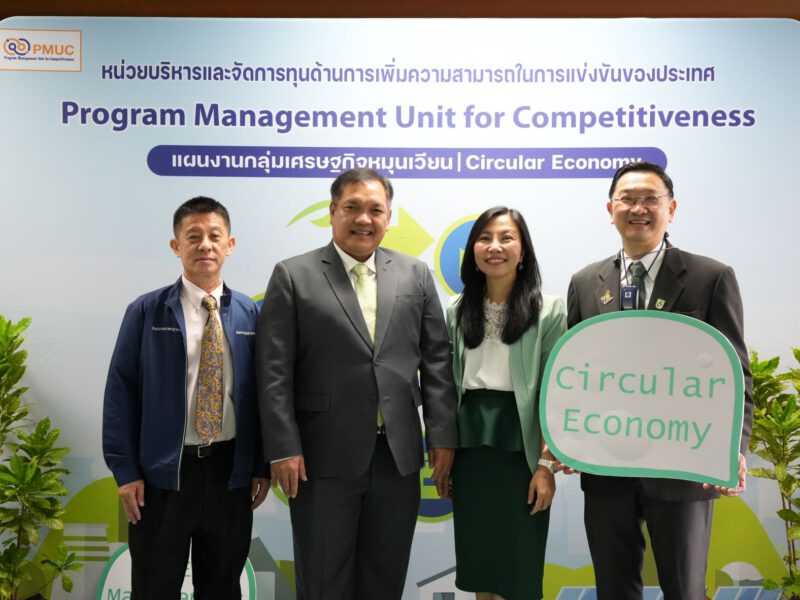
Improving performance and quality of recycled PET for packaging industry
Principal Investigator: Dr. Amporn Sane, Kasetsart University
Polyethylene terephthalate (PET) is one of the most widely used plastics. Every year, one million tons of PET plastic waste is generated in Thailand. PET plastic recycling will not only reduce the amount of waste destined to landfills or polluting the environment, but also minimize the consumption of new resources. The key to PET recycling is the safety and processability of recycled PET (rPET), especially when it is used for the production of a food contact material. This project, therefore, focuses on the development of rPET for the packaging industry, by examining the effect of quality and contamination of PET waste to the properties of rPET, the decontamination and cleaning efficiency of the current industrial recycling system and the degradation of rPET during the recycling and processes. The project is expected to increase the competitiveness of Thai packaging industry, enable the circular economy, lower the amount of plastic waste going to landfills and reduce environmental burden associated with plastic waste. This project is sponsored by PMU-C in collaboration with PTT Global Chemical Public Company Limited.
Development of the modular steel building construction system with a digital platform to improve competitiveness to make a transition to a circular economy
Principal Investigator: Dr. Nongnuch Poolsawad, National Science and Technology Development Agency
The construction sector is a resource intensive industry and thus becomes a priority industry to implement circularity. Among various forms of construction, modular steel structure offers several benefits, including rapid fabrication and installation processes, high quality of the structure and reusability. This project focuses on the development of modular steel building construction system with Building Information Modeling (BIM). BIM-based tools and platforms enable efficient construction design and planning, minimize errors, make an estimation of building material quantities and give a calculation of material circularity indicator (MCI). By improving resource use efficiency, minimizing waste and increasing material circularity, the project will enhance the competitiveness of Thai construction industry and support its transition into the circular economy. The National Science and Technology Development Agency will take the lead in executing the project in collaboration with Rajamangala University of Technology Thanyaburi, Chulalongkorn University, King Mongkut’s University of Technology Thonburi and Athletic Solution Company Limited.
Study on the circular dairy farming model for waste management and sustainable development
Principal Investigator: Dr. Nattaphorn Kaewprathum, Dairy Farming Promotion Organization of Thailand
This project aims to develop the circular dairy farming model and the utilization of dairy farm wastes. Dairy farmers will be invited to engage in the design and implementation to build a sense of ownership and a strong base for community development. The project is expected to bring sustainability to the dairy farming sector, while conserving natural resources and protecting the environment, as well as adding economic value to wastes. Results of this study will be developed into a dairy farm management manual and served as a model for national expansion. This project is carried out by the Dairy Farming Promotion Organization of Thailand in collaboration with Prince of Songkla University, Asia-Pacific International University and Mahidol University.
Development of circular product labelling system to promote material circularity to move towards the national policy of circular economy
Principal Investigator: Asst. Prof. Dr. Rattanawan Mungkung, Kasetsart University
Circular product labelling plays an important role in fostering circular economy activities. It stimulates market development and innovation in resource efficient products and services. This project will design the circular product labelling system through the following exercises: reviewing circular product labelling schemes in various countries to find best practices, performing SWOT analysis and prioritizing products for labelling scheme development. The project will focus on five sectors: agriculture and food, building materials, plastic, packaging, and fashion and lifestyle products. The project is carried out by Kasetsart University in partnership with Thailand Environment Institute, the Ministry of Industry and the Federation of Thai Industries.







